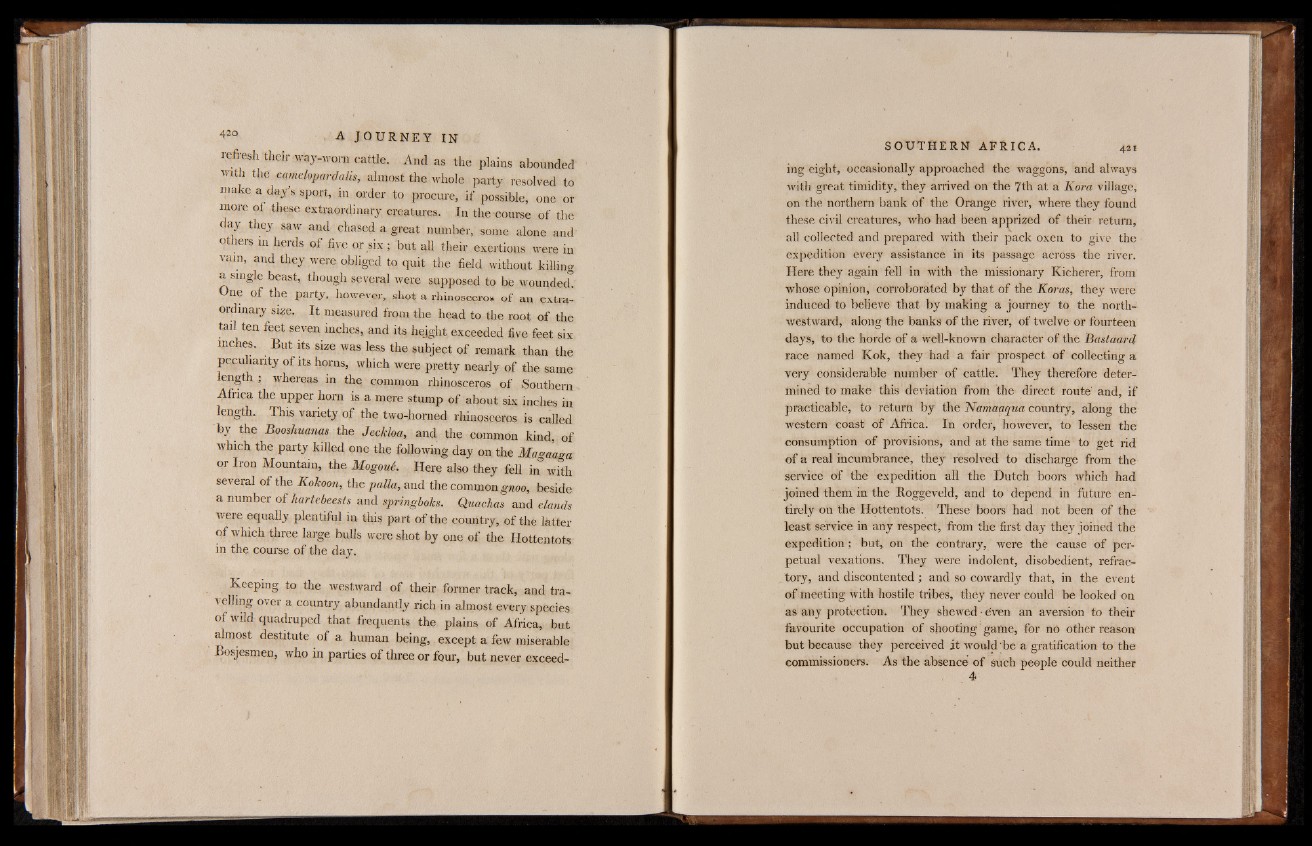
refresh their way-worn cattle. And as the plains abounded
with the Camelopardalis, almost the whole party resolved to
make a day’s sport, in order to procure, if possible, one or
more of these extraordinary creatures. In the course of the
day they saw and chased a great number, some alone and
others in herds of five or six ; but all their exertions were in
vain, and they were obliged to quit the field without killing
a single beast, though several were supposed to be wounded.
ne of the party, however, shot a rhinosceros of an extraordinary
size. I t measured from the head to the root of the
tail ten feet seven inches, and its hejght exceeded five feet six
inches. But its size was less the subject of remark than the
peculiarity of its horns, which were pretty nearly of the same
length ; whereas in the common rhinosceros of Southern
Africa the upper horn is a mere stump of about six inches in
length. This variety of the two-horned rhinosceros is called
by the Booshuanas the Jeckloa, and the common kind of
which the party killed one the following day on the Magaaga
or Iron Mountain, the Mogoue. Here also they fell in° with
several of the Kokoon, the palla, and the common gnoo, beside
a number of hartebeests and springboks. Quachas and elands
were equally plentiful in this part of the country, of the latter
of which three large bulls were shot by one of the Hottentots
in the course of the day.
Keeping to the westward of their former track, and travelling
over a country abundantly rich in almost every species
of wild quadruped that frequents the plains of Africa, but
almost destitute of a human being,. except a few miserable
Bosjesmen, who in parties of three or four, but never exceeding
eight, occasionally approached the waggons, and always
with great timidity, they arrived on the 7th at a Kora village,
on the northern bank of the Orange river, where they found
these civil creatures, who had been apprized of their return,
all collected and prepared with their pack oxen to give the
expedition every assistance in its passage across the river.
Here they again fell in with the missionary Kicherer, from
whose opinion, corroborated by that of the Koras, they were
induced to believe that by making a journey to the northwestward,
along the banks of the river, of twelve or fourteen
days, to the horde of a well-known character of the Bastaard
race named Kok, they had a fair prospect of collecting a
very considerable number of cattle. They therefore determined
to make this deviation from the direct route and, if
practicable, to return by the Namaaqua country, along the
western coast of Africa. In order, however, to lessen the
consumption of provisions, and at the same time to get rid
of a real incumbrance, they resolved to discharge from the
service of the expedition all the Dutch boors which had
joined them in the Roggeveld, and to depend in future entirely
on the Hottentots. These boors had not been of the
least service in any respect, from the first day they joined the
expedition ; but, on the contrary, were the cause of perpetual
vexations. They were indolent, disobedient, refractory,
and discontented ; and so cowardly that, in the event
of meeting with hostile tribes, they never could be looked on
as any protection. They shewed • even an aversion to their
favourite occupation of shooting game, for no other reason
but because they perceived it would be a gratification to the
commissioners. As the absence of such people could neither
. 4